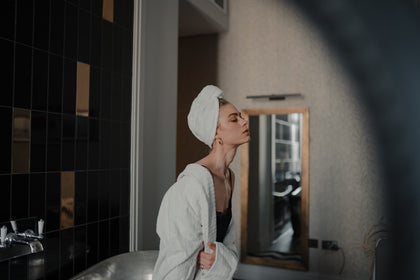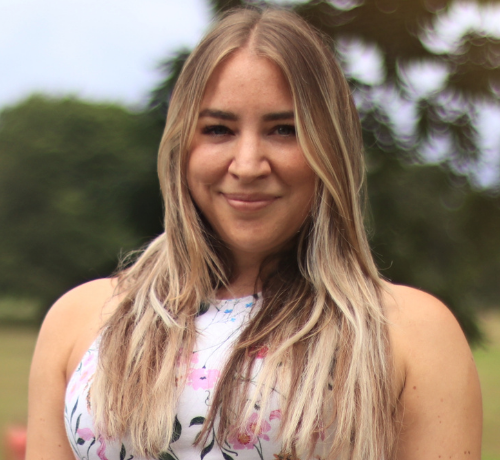We're all familiar with the age-old rule of shampooing: Lather, rinse, repeat. But there's no simple saying when it comes to how often you should wash your hair—and in fact, recent years have seen the rise of the "no-poo" (no-shampoo) movement, wherein people forego hair-washing altogether with the hope that their "natural" hair health will bounce back.
Keep reading to learn what happens if you don't wash your hair. Plus, find out which all-natural hair treatments can leave your locks nourished, gorgeous and healthier than ever.
What's the Point of Washing Your Hair?
There's never been a hard-and-fast rule as to how often you need to be washing your hair— ultimately, much of the decision comes down to personal preference. For instance, if you have thin or naturally oily hair, you might need more frequent washing; if you have thick or curlier hair, you might find you don't need to wash as often.
No matter your hair type, though, you'll be best off washing your hair with some level of frequency in order to keep your strands (and scalp) healthy. VEGAMOUR spoke to Toronto-based film hairstylist Chrystal Lotz about why the hair and scalp need to be cleaned.
"If you consider that the scalp is full of sweat glands, it is important to keep the scalp clean and dry," Lotz explained. "Would you go days or weeks without washing your armpits? No, of course not—[and] the same goes for your scalp."
Read More: How Often Should You Wash Your Hair?
What's the Reasoning Behind Not Washing Your Hair?
Hair trends come and go, and the "no-poo" movement has found the spotlight more than once before. In recent months, foregoing shampoo has once again become a trending topic on TikTok and other social media platforms, with people opting to rinse simply with water. But what triggers popular waves of aversion to routine hair-washing?
Many people stop using shampoo out of frustration. Consumers have become more aware of the potentially adverse effects of detergents and cleansing agents often found in drugstore shampoo formulas, such as sulfates and silicones.
Sulfates are a fairly harsh detergent, and they can over-cleanse hair, stripping away its natural oils. This can lead to dry hair that is brittle and may break easily. One review in Environmental Health Insights studied the possible toxicity of sodium lauryl sulfate, and researchers found that public perception of the agent was negative overall. It was previously thought that sulfates caused cancer, but scientific research has since refuted this claim.
Especially for people with manes prone to dryness, frizz and damage—including those with color-treated hair, previously damaged hair or curly or coarse hair—sulfates can create scalp issues including scalp inflammation, irritation, dry hair and other problems. Silicones, meanwhile, can weigh down hair and create excess build up, especially on fine hair.
The instinct to forego hair-washing makes sense, especially for those who have had bad experience with harsh hair products. Often facing issues with dry hair, an oily scalp, frizziness or other issues, people try to stop washing their hair in hopes of a "reset." But hair does need to be cleaned, and ditching your hair care routine isn't necessarily the solution.
Luckily, there are options today for sulfate- and silicone-free shampoos that cleanse the hair and scalp more gently and don't leave excess product behind. When you use the right product for your hair and scalp's needs, frequent shampooing can do a lot for your hair.
The COVID-19 pandemic and ensuing lockdown created a situation where loungewear reigned and personal hygiene dropped to the bottom of most people's to-do lists. Since then, many people have continued forego frequent shampooing. But others have taken it a step further, stopping washing their hair completely and embracing the "no-poo" movement.
It can sound tempting, but "no-poo" comes with its own set of risks. There's a common misconception that the "no-poo" technique can replenish natural oils on the scalp to address dryness, but in fact, the opposite is often true.
"Many believe [that] not washing your hair is good for dryness," Lotz explained. "[But] the oil produced by your scalp [when you skip washing] does not penetrate the hair shaft and therefore sits on top of your hair, doing nothing for the overall health of your hair."
In the longer term, neglected and unwashed hair can create issues with affect hair and scalp health, setting the stage for an array of unpleasant (and potentially damaging) consequences.
"An overgrowth of bacteria [on the scalp] can cause a wide array of scalp issues," Lotz said. Long story short: It's actually important to wash your hair to keep it healthy.
What Happens When You Don't Wash Your Hair?
We've all experienced greasy hair after we skip shampooing or wait too long between showers—but what happens when you ditch shampoo for weeks or months at a time? As tempting as it may be to let your hair-washing routine fall by the wayside, dirty hair isn't ideal. If you stop washing your hair, consequences can include:
Dandruff
Dirty hair doesn't cause dandruff, but more dirt on your scalp than usual can trigger scalp inflammation, clogged oil glands and an itchy scalp. VEGAMOUR spoke to Marie Burke, resident hair and skin expert at O'Flynn Medical.
"Shampoo helps clean away the yeast that forms on the scalp. However, without it, you'll have a build-up and an increase in yeast formation, this leads to more dandruff," Burke explained. Rather than skipping shampoo and hoping that all the natural oils on your scalp will do the work for you, you're better off to choose a gentle shampoo and conditioner that will cleanse and moisturize your scalp without causing irritation.
Unpleasant Smells
Hair traps moisture, so when you go too long between washes, too much bacteria can accumulate on your scalp. This bacteria could result in unwanted smells on your scalp and hair.
"Removing excess grease, hair fall-out, dirt and products prevent unsavory smells and unhealthy skin conditions," explained Madison Dufour, barber and cosmetologist and blogger at The Exquisite Find.
Read More: What Causes a Smelly Scalp?
Oily Scalp
This is a common one that we've all probably experienced one time or another: If you aren't washing your hair often enough, a greasy scalp is a telltale sign. Sebaceous glands on the scalp produce sebum, which can accumulate on the scalp and hair. If too much oil builds up, you may even experience scalp pain. If you have thin hair or fine hair, you might find that your hair gets oily or greasy faster, so it may be more difficult to skip washing.
You should still shampoo your hair frequently, but there is one quick and easy fix for greasy unwashed hair: dry shampoo. Dry shampoo works by soaking up excess oils on your scalp to prevent greasiness and build-up. GRO Dry Shampoo, VEGAMOUR's proprietary plant-based formula, smells incredible and is lightweight, non-toxic and made without talc or benzene. This is a great way to freshen up your scalp so you can skip the hair wash when you're running late on a busy morning or just too tired to shower before bed.
Ingrown Hairs
You might have experienced ingrown hairs on your bikini line or along your armpits, but if you aren't washing your hair often enough, you can actually experience ingrowns on your scalp, too. These hairs aren't the result of waxing or shaving—instead, they occur because of oily hair or hair with too much leftover hair product built up on the scalp.
"The longer you go between washes, the more dead skin and scalp oil build-up, which can cause ingrown hairs," Burke explained. If you've skipped washing and are noticing scalp discomfort, be mindful of ingrowns, as they can lead to irritation, inflammation or even infection.
Read More: Why Does My Hair Get Greasy so Fast?
Hair Loss and Reduced Hair Growth
When you aren't washing your hair as often as you need to, your scalp gets congested with dead skin cells, old product and dirt and grime. All of this can build up and clog hair follicles, preventing new hair from growing and even leading to excess hair shedding.
"The result of leaving oil on your scalp for days or weeks at a time can lead to plugged hair follicles, which essentially smothers the follicle, killing it off and leading to hair loss over time," Lotz explained.
When you're congested with a cold, you blow your nose—so treat your scalp the same! If you're noticing more hair loss or slowed hair growth, make sure you're washing your hair regularly and with a gentle product that won't irritate your scalp, as cleansing away excess scalp oils and build-up will help reduce hair loss.
If you're concerned about thinning hair (or if you just want fuller-looking hair), you can incorporate a hair serum in addition to regular shampooing. GRO Hair Serum is a non-toxic, clinically proven serum that supports healthy hair and follicles, especially if you don't shampoo daily.
Find Out: Is Washing Your Hair Everyday Bad?
Is It Possible to Over-Wash Your Hair?
It's well-known that foregoing shampoo can cause issues—but over-washing hair can have negative consequences as well.
"Over-washing can weaken your roots. It also makes your hair dry and brittle, leading to hair fall," nutrition, health and fitness expert Megan Ayala told VEGAMOUR. "That's because [many] shampoos have a lot of [harsh] chemicals in them. Constantly using these harsh chemicals [can] damage hair in the long run."
Harsh shampoos can actually cause an increase in oil production on the scalp and increase the chances of you experiencing an uncomfortable scalp condition. If you over-wash your hair and often apply a chemical treatment or put hair in a tight style that tugs at the root, you could experience excessive hair fall.
Finding Balance with Washing Your Hair
How often you wash your hair is a personal decision. You need to consider your hair texture and type, the climate you live in, your lifestyle choices and even how much perspiration your body produces. (For instance, exercise can cause excess sweat to linger on the scalp, so if you work out frequently, you may find you need to wash more often.)
In terms of hair type, straight, fine hair retains moisture quickly, picks up scents and can get greasy fast, whereas thick, wavy, coiled hair tends to be dryer because the natural oils can't travel down a kinky hair shaft as quickly. According to the American Academy of Dermatology, people with textured hair or tight curls only need to wash their hair once a week or every other week. If you have fine or thin hair, though, you may need to wash more often.
Regardless of whether you wash your hair once a day, once a week or once a month, the products that you use will impact your hair health. To transform the look and feels of your strands, wash with products that will treat your scalp with tenderness. And if you do decide that washing less is best, pay attention to the look and feel of your strands—they'll tell you everything you need to know.
#include-related-slider#
More from VEGAMOUR:
- Shop: Best Products for Dry Hair
- Dry Scalp and Oily Hair? Try This
- How to Care for Fine Hair
- How Often Should You Condition Your Hair?
- Shop Maddie Castellano's Top VEGMAOUR Picks





















